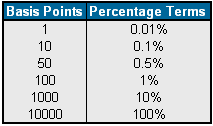A basis point is a unit of measure used in finance to describe the percentage change in the value or rate of a financial instrument. One basis point is equivalent to 0.01% (1/100th of a percent) or 0.0001 in decimal form. In most cases, it refers to changes in interest rates and bond yields. In the bond market, a basis point is used to refer to the yield that a bond pays to the investor. For example, if a bond yield moves from 7.45% to 7.65%, it is said to have risen 20 basis points.The usage of the basis point measure is primarily used in respect to yields and interest rates, but it may also be used to refer to the percentage change in the value of an asset such as a stock. It may be heard that a stock index moved up 134 basis points in the day's trading. This represents a 1.34% increase in the value of the index.

The easiest way to convert basis points into a percent form is by simply taking the amount of basis points and multiply by 0.0001 which will give the percent in decimal form. So if you have to convert 384 basis points into a percent, simply multiply 384 by 0.0001. This will give you 0.0384 which is 3.84% (0.0384 x 100).

The easiest way to convert basis points into a percent form is by simply taking the amount of basis points and multiply by 0.0001 which will give the percent in decimal form. So if you have to convert 384 basis points into a percent, simply multiply 384 by 0.0001. This will give you 0.0384 which is 3.84% (0.0384 x 100).
No comments:
Post a Comment